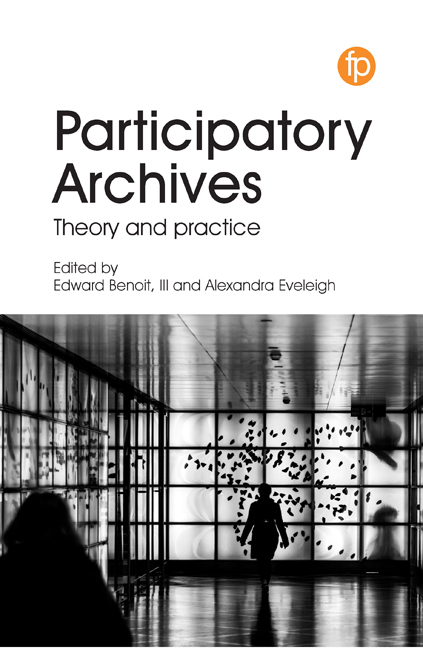Book contents
- Frontmatter
- Contents
- Figures and table
- Notes on contributors
- 1 Defining and framing participatory archives in archival science
- SECTION 1 SOCIAL TAGGING AND COMMENTING
- SECTION 2 TRANSCRIPTION
- SECTION 3 CROWDFUNDING AND OUTREACH
- SECTION 4 ALTERNATIVE AND ACTIVIST COMMUNITIES
- 14 Degrees of mediation: a review of the intersectionality between community and participatory archives
- 15 Activist participatory communities in archival contexts: theoretical perspectives
- 16 Documenting a social movement in real time: the Preserve the Baltimore Uprising 2015 archive project
- 17 Community partnerships and collection development in the Legacy of Ahmed Project
- 18 Challenges, opportunities and future directions of participatory archives
- Notes
- Index
15 - Activist participatory communities in archival contexts: theoretical perspectives
from SECTION 4 - ALTERNATIVE AND ACTIVIST COMMUNITIES
Published online by Cambridge University Press: 25 October 2019
- Frontmatter
- Contents
- Figures and table
- Notes on contributors
- 1 Defining and framing participatory archives in archival science
- SECTION 1 SOCIAL TAGGING AND COMMENTING
- SECTION 2 TRANSCRIPTION
- SECTION 3 CROWDFUNDING AND OUTREACH
- SECTION 4 ALTERNATIVE AND ACTIVIST COMMUNITIES
- 14 Degrees of mediation: a review of the intersectionality between community and participatory archives
- 15 Activist participatory communities in archival contexts: theoretical perspectives
- 16 Documenting a social movement in real time: the Preserve the Baltimore Uprising 2015 archive project
- 17 Community partnerships and collection development in the Legacy of Ahmed Project
- 18 Challenges, opportunities and future directions of participatory archives
- Notes
- Index
Summary
We start this chapter by acknowledging that the label ‘activist participatory communities’ is a construct that is rooted in what we will describe as the ‘institutional gaze’. Our use of this construct as a means to define and under - stand ‘different’ forms of archiving is therefore complex and can have positive and negative consequences. In our archival context, which is the place from which both authors speak, the label can be used constructively by archive professionals as a means of acknowledging, seeking to understand, embrace and support archival activities and spaces that occur outside traditional archive structures. However, all processes of defining that position something or someone against an implicitly accepted ‘norm’ can be problematic. The fixing of the institutionally rooted (and therefore mainstream) archival gaze on the ‘other’ carries the risk of reinforcing distance, a continual forcing and holding at the margins, as opposed to an embedding into the heart of archival theory and practice.
In writing this chapter, we acknowledge this tension, and rather than adopting the terminology of hierarchies and of ‘alternative’ and ‘other’ we agree with views that recognise and embrace the multiplicity of ways of thinking about and ways of doing archiving that coexist in the archival multiverse. Indeed we write to celebrate the richness of archival spaces and practices that sit alongside the traditional archive institution. We believe that our archive institutions and the associated archive profession is (and will continue to be) enriched and challenged to change through growing exposure to (and collaboration with) the theory, methods, people, spaces, action and outputs that drive the processes of archiving outside the walls of the traditional archive institution.
Both authors embrace postmodern understandings of the archive, and in our teaching of emerging archive professionals we acknowledge the traditions from which the profession has grown, while opening our students up to new and growing currents of thinking, which position archive theory and practice as a pluralistic and dynamic space in which a multiplicity of positions and perspectives coexist.
- Type
- Chapter
- Information
- Participatory Archives , pp. 173 - 190Publisher: FacetPrint publication year: 2019
- 3
- Cited by

